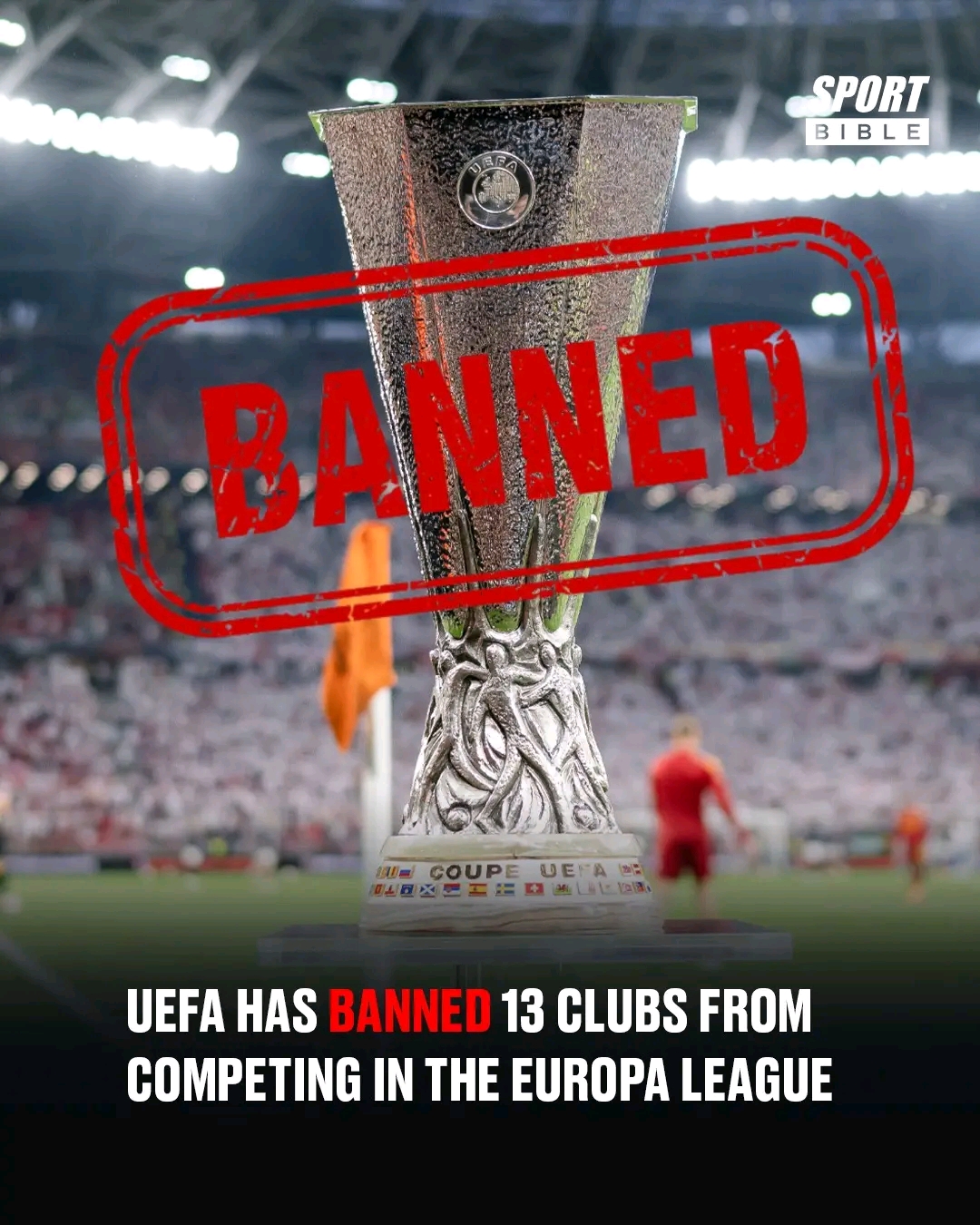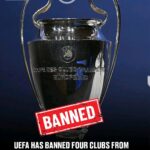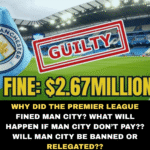UEFA has banned 13 clubs from competing in the Europa League

European football operates under strict regulatory frameworks designed to maintain competitive integrity, financial stability, and ethical standards across all competitions. The Union of European Football Associations (UEFA), as the governing body for European football, holds ultimate authority over continental tournaments including the prestigious Champions League, the secondary Europa League, and the newly established Europa Conference League. Throughout the Europa League’s history, UEFA has wielded its disciplinary powers to exclude thirteen clubs from participation, implementing sanctions that range from single-season suspensions to decade-long bans.
These enforcement actions reflect UEFA’s commitment to upholding the fundamental principles that govern European football. The organization’s intervention becomes necessary when clubs violate established regulations, whether through financial misconduct, match-fixing scandals, administrative failures, or breaches of player eligibility rules. Each case represents a unique set of circumstances that challenged UEFA’s regulatory framework and prompted decisive action to preserve the competition’s integrity
Among the most prominent cases involving Europa League exclusion is AC Milan’s ban from the 2019/20 season due to Financial Fair Play (FFP) violations. The Italian giants, despite their illustrious European pedigree, found themselves excluded from continental competition after failing to meet UEFA’s stringent financial regulations. The Court of Arbitration for Sport (CAS) confirmed the exclusion, stating that “AC Milan is excluded from UEFA club competitions of the sporting season 2019-2020.”
AC Milan’s situation highlighted the serious consequences clubs face when they fail to balance their books according to UEFA’s requirements. The club’s “voluntary acceptance” of the ban, as reported by various media outlets, demonstrated their acknowledgment of the severity of their financial infractions. This case served as a stark reminder that even the most successful and historically significant clubs are not immune to UEFA’s regulatory enforcement.
The Financial Fair Play framework, introduced by UEFA in 2010, aims to prevent clubs from spending beyond their means and accumulating unsustainable debt levels. The regulations require clubs to balance their books over a rolling three-year period, ensuring that expenditure on players and wages does not significantly exceed revenue from football-related activities. AC Milan’s exclusion underscored UEFA’s determination to enforce these rules regardless of a club’s stature or commercial value to the competition.
Similarly, Spanish club Málaga faced a two-year UEFA suspension in 2012, resulting in their exclusion from the 2013/14 Europa League due to unpaid bills and financial irregularities. The situation arose from the club’s failure to meet their financial obligations to players, staff, and other creditors, violating UEFA’s licensing requirements. While the second year of the suspension was waived on appeal, CAS rejected their attempt to overturn the first year, emphasizing the importance of clubs maintaining their financial commitments.
Málaga’s case illustrated the broader challenges facing clubs during periods of financial instability. The club’s rapid rise under wealthy ownership had been followed by equally dramatic financial difficulties, leaving them unable to meet basic obligations. UEFA’s intervention protected the interests of players and other stakeholders while sending a clear message about the consequences of financial mismanagement.
The scourge of match-fixing has prompted some of UEFA’s most severe sanctions, with several clubs receiving significant bans for their involvement in corruption scandals. Turkish football was particularly affected, with both Beşiktaş and Fenerbahçe receiving substantial suspensions following domestic match-fixing investigations.
Beşiktaş received a one-year suspension in June 2013, preventing their participation in European competition for the 2013/14 season. The ban directly resulted from their involvement in domestic match-fixing activities that had shaken Turkish football to its core. The scandal revealed systematic corruption within Turkish football, prompting UEFA to take decisive action to prevent clubs implicated in domestic corruption from participating in European competitions.
Fenerbahçe faced even more severe consequences, receiving a two-year ban that significantly impacted their European ambitions. The Istanbul-based club, one of Turkey’s most successful teams, found themselves excluded from continental competition during a period when they might otherwise have been competing at the highest level. This extended ban reflected the gravity of their involvement in match-fixing activities and served as a deterrent to other clubs considering similar violations.
The Albanian club Skënderbeu received perhaps the most severe punishment in Europa League history, with a ten-year ban from all UEFA competitions implemented in 2018. Additionally, the club was fined €1 million after CAS determined that they were responsible for match-fixing activities in both domestic and continental matches. The panel stated they had found “to its comfortable satisfaction that Skenderbeu was responsible for match-fixing activities.”
This unprecedented punishment demonstrated UEFA’s zero-tolerance approach to match-fixing and corruption. The ten-year duration effectively ended Skënderbeu’s European ambitions for the foreseeable future, while the substantial financial penalty added another layer of punishment. The case highlighted the far-reaching consequences of corruption in football and UEFA’s determination to protect the integrity of European competitions.
Romanian club Steaua Bucharest also faced sanctions related to match-fixing allegations, receiving a suspended one-year ban with a five-year probationary period. This conditional punishment allowed the club to continue participating in European competition while maintaining the threat of immediate exclusion if further violations occurred. The probationary approach reflected UEFA’s willingness to provide opportunities for rehabilitation while maintaining strict oversight
Several clubs have been excluded from Europa League participation due to administrative failures and violations of UEFA’s regulatory framework. These cases often involve procedural errors, documentation failures, or violations of player eligibility rules that compromise the competition’s fairness and integrity.
FC Sion’s expulsion from the 2011/12 Europa League exemplified how administrative violations can have immediate and severe consequences. The Swiss club was removed from the competition for fielding ineligible players who had been signed while the club was still under a transfer ban imposed by FIFA. This violation of player eligibility rules not only resulted in their expulsion but also allowed Celtic to be reinstated into the competition.
The case highlighted the importance of clubs understanding and adhering to all relevant regulations, including those imposed by different governing bodies. FC Sion’s failure to respect the FIFA transfer ban while participating in UEFA competition created a conflict that could only be resolved through their removal from the tournament. Despite their appeal to CAS, the decision was upheld, emphasizing the finality of such regulatory violations.
Rangers FC faced exclusion from European competition in the 2013/14 season due to administrative difficulties stemming from their financial collapse. The Scottish club’s administrator conceded that they were unable to meet UEFA’s March 31st accounts deadline, a fundamental requirement for European competition licensing. This situation arose during Rangers’ well-documented financial crisis, which had seen the club undergo administration and reformation.
The Rangers case demonstrated how financial instability can have cascading effects beyond immediate monetary concerns. Their inability to provide required financial documentation within prescribed timeframes violated UEFA’s licensing requirements, leading to automatic exclusion from European competition. This administrative failure occurred during one of Scottish football’s most significant crises, highlighting the interconnected nature of financial and administrative compliance.
UEFA’s commitment to financial responsibility extends beyond Financial Fair Play regulations to encompass basic debt obligations and financial commitments. Several clubs have faced Europa League exclusions due to unpaid debts to players, staff, or other football-related creditors.
Partizan Belgrade received a three-season ban from both Champions League and Europa League competition in 2017 due to unpaid debts. However, this case also demonstrated UEFA’s willingness to reverse sanctions when clubs demonstrate genuine efforts to resolve their financial issues. The ban was subsequently overturned after Partizan provided evidence that they had cleared their unpaid debts, showing that UEFA’s enforcement actions aim to encourage compliance rather than simply punish violations.
The Partizan case illustrated the importance of clubs maintaining their financial obligations to all stakeholders in football. Unpaid wages to players and staff not only violate contractual agreements but also undermine the broader financial ecosystem of football. UEFA’s intervention protected the interests of those affected while providing an incentive for the club to resolve their financial difficulties.
Dnipro, the Ukrainian club, received a one-year ban in 2016 over financial issues that prevented them from meeting UEFA’s licensing requirements. This case occurred during a period of significant political and economic instability in Ukraine, highlighting how external factors can impact clubs’ ability to maintain financial compliance. Nevertheless, UEFA maintained its standards regardless of the underlying causes of financial difficulties.
Multiple clubs, including Rapid Bucharest, Inter Baku, and Târgu Mureș, have received one-season suspensions for various financial infractions. UEFA’s policy states that such bans would be enforced in the next season the clubs qualified for Champions League or Europa League competition within a three-season period, ensuring that sanctions have meaningful impact regardless of the clubs’ immediate competitive success.
The distribution of Europa League bans across different European regions reveals interesting patterns about the challenges facing football in various parts of the continent. Turkish football has been particularly affected, with multiple clubs receiving suspensions related to match-fixing scandals. This concentration suggests systemic issues within Turkish football that required UEFA intervention to address.
Eastern European clubs have also featured prominently among sanctioned teams, often due to financial difficulties and administrative challenges. Countries undergoing economic transition or political instability have seen their clubs struggle to meet UEFA’s increasingly stringent requirements, highlighting the intersection between broader socioeconomic conditions and football governance.
Southern European clubs, including those from Italy and Spain, have faced sanctions primarily related to Financial Fair Play violations and debt issues. These cases often involve clubs with significant historical success attempting to maintain competitive performance despite financial constraints, leading to violations of UEFA’s regulatory framework.
UEFA’s approach to sanctions has evolved significantly over the years, reflecting lessons learned from previous cases and changing priorities within European football governance. Early enforcement actions often focused on immediate violations and reactive measures, while more recent interventions demonstrate a more sophisticated understanding of systemic issues and preventive regulation.
The introduction of Financial Fair Play regulations marked a significant shift toward proactive financial oversight, with UEFA implementing comprehensive monitoring systems to identify potential violations before they reach crisis levels. This evolution has led to more nuanced enforcement actions, including graduated sanctions and opportunities for rehabilitation.
UEFA’s willingness to overturn sanctions when clubs demonstrate genuine compliance efforts, as seen in the Partizan Belgrade case, reflects a mature approach to regulation that prioritizes compliance over punishment. This flexibility encourages clubs to address underlying issues rather than simply accept exclusion from competition.
The exclusion of clubs from Europa League competition has far-reaching implications beyond the immediate punishment of the sanctioned teams. These actions affect the competitive balance of the tournament, alter qualification pathways for other clubs, and send powerful messages about UEFA’s commitment to regulatory enforcement.
When prominent clubs like AC Milan are excluded, it changes the entire dynamic of the competition. Other clubs benefit from reduced competition for qualification spots, while the tournament loses some of its commercial appeal and competitive intensity. These trade-offs highlight the complex calculations UEFA must make when implementing sanctions.
The precedent set by these exclusions influences the behavior of all European clubs, creating incentives for proactive compliance and risk management. Clubs invest significant resources in ensuring they meet UEFA’s requirements, viewing compliance as essential for their competitive and commercial success.
As European football continues to evolve, UEFA faces ongoing challenges in maintaining the balance between competitive integrity, financial sustainability, and commercial success. The increasing financial disparities between clubs, the growing influence of external investment, and the complexity of modern football operations all present new regulatory challenges.
The COVID-19 pandemic has added another layer of complexity, with many clubs facing unprecedented financial pressures that test the limits of existing regulatory frameworks. UEFA has shown flexibility in adapting its enforcement approach to these exceptional circumstances while maintaining core principles of financial responsibility and competitive integrity.
Looking forward, UEFA’s regulatory framework will likely continue evolving to address emerging challenges while building on the lessons learned from the thirteen Europa League exclusions examined here. These cases provide valuable insights into the effectiveness of different enforcement approaches and the importance of maintaining clear, consistent standards across European football.
The story of UEFA’s Europa League bans represents more than just a series of disciplinary actions; it reflects the ongoing effort to build a sustainable, fair, and competitive European football ecosystem. Each exclusion represents both a failure of club governance and an opportunity to strengthen the regulatory framework that protects the interests of all participants in European football.
Through consistent enforcement of its regulations, UEFA has demonstrated that success on the pitch cannot excuse failures in governance, financial management, or ethical conduct. The thirteen clubs excluded from Europa League competition serve as important case studies in the consequences of regulatory non-compliance and the importance of maintaining the highest standards in European football administration.















